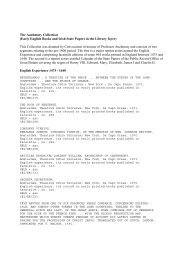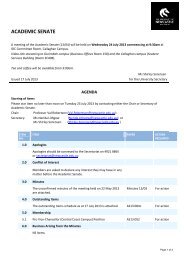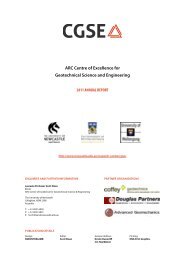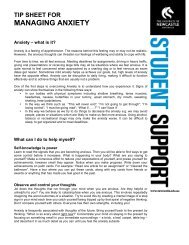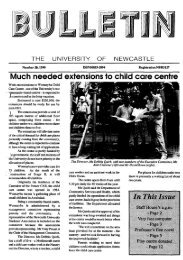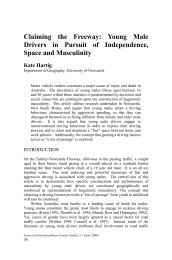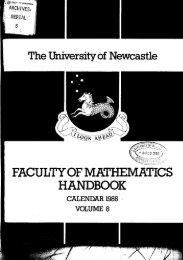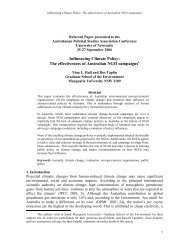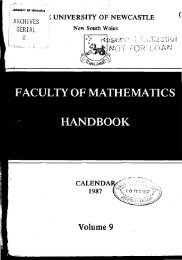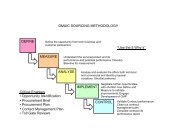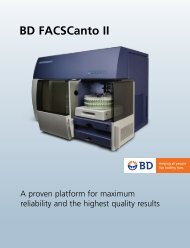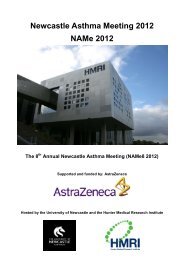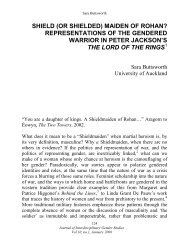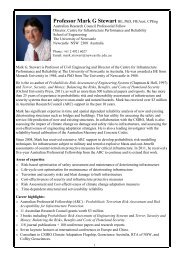n - University of Newcastle
n - University of Newcastle
n - University of Newcastle
You also want an ePaper? Increase the reach of your titles
YUMPU automatically turns print PDFs into web optimized ePapers that Google loves.
96 AN AUSTEALIAE LASGUAGE.<br />
5. -1-iko ; m., for the pu?.ip?se <strong>of</strong> initiating the action <strong>of</strong><br />
the aerb.<br />
.Ex :-Tetti kolag bag, -1 am about todie'; n-aita kolag<br />
bag, ' I am about to depart'; pirival kolag noa: 'he is<br />
about to be king'; worolvai kolag bara, 'they are about to<br />
fight '; tanan bag miyeliiko, 'I come to speak,' 'I am come<br />
for the purpose <strong>of</strong> speakiiig'; tanan bag ~riya-uwil koa<br />
banug, ' I am come in order to speak to thee,' ' I am come that<br />
1 may speak to thee'; wiya-umil koa banu g. 'I wish to speak<br />
to thee'; gurrulli ta, 'it is the act <strong>of</strong> hearing'; gurrulliko,<br />
'for the purposc <strong>of</strong> the act <strong>of</strong> hearing'; 'to hex, to hearken.'<br />
6. -m-illi-ko; m., for the pzcrpose <strong>of</strong> the i~zitiation <strong>of</strong><br />
the act <strong>of</strong> causation.<br />
E.Z. :-K a i: u mi 11 i ? ti a, ' come and hel-p me '; lit., 'come<br />
exercise causative porn-er on me '; umil_lja bi ti a, el thou<br />
me, assist me'; i.e., ' cause the exercise <strong>of</strong> potver to me. "9<br />
7. -m-ulli-ko ; m., for cnzcsaiion and efecti~se potoer.<br />
Ex.:--Tarig ka-mulliko, 'to mix'; lit., 'for-to causeto be<br />
across and across'; gurra-nlulla bon, ' cause him to hear<br />
or know'; ka-mullala noa yantin-birug umulli-birug,<br />
'he rested from all the work '; lit., 'he caused himself to be<br />
froin all, from the act <strong>of</strong> causation and effectire power.'<br />
Uma noa yantin tara, 'he made all things'; um&n bag<br />
unni, 'I make this'; nu-mulli ko, ' to make a personal effort,<br />
to try, to attempt '; pirral-mulla bon, 'urge him, constrain<br />
him'; lit., 'be hard at him'; pirral umulla bon, 'make him<br />
hard, cause him to be hard'; pirriral-mullin bon, 'strengthen-<br />
ing hin~'; na-muubilliko tia umulla. ' cause me to be per-<br />
mitted to see'; liamunbilla bin nakilliko, 'let it be per-<br />
mitted to cause thee to see'; equivalent to, ' receive thy sight.'<br />
S. -11; m., preseltt time.<br />
Ex.-Unni, 'this' present; unnoa, 'that' present; untoa,<br />
'that other' present; unnug, 'that,' as an object, present there;<br />
unti, 'this present place ' here; un ta, ' that place' spoken <strong>of</strong>;<br />
pita1 lian~n bi, 'thou wilt be joyful'; pitll banun bi,<br />
' thou wilt rejoice.'<br />
9. -g-ulli-ko ; m., for one fo act with efectivepower.<br />
Ex.-Bu g-bu g-gulla, 'kiss,' thnt is, 'effect a kiss'; bug-<br />
bug-kimunbilla bon, 'let him kiss'; bug-bug gatoa,' it<br />
is I who kiss'; bug-bug-gan bag,'I kiss'; bug-bug-gatoara,<br />
' that which is kissed ' ; t e tti bu g-gulli li o, ' to effect death by<br />
personal power'; 'to kill'; t e tti bug- ga bon, 'he is killed '; lit.,<br />
'some person hath killed him'; tetti bug-ga bon bag, 'Ihave<br />
killed him.'<br />
THE KEY.<br />
10. -p-illi-ko ; m., to act, exckcdi~ag the idea <strong>of</strong> cnz~sation.<br />
Ex.-U p-illiko, ' to exercise personal power,' without causation<br />
; up - ai - g a, ' to exercise personal power,' without completion;<br />
pai-pilliko, 'to seem,' 'to appear'; pai-piililro maraito,<br />
'for the spirit to appear'; pai-pBa Iloa Eliath, 'Elins<br />
he appeared'; pai-p6a bon a gelo, ' an angel appeared to him.'<br />
, 11. -p-ulli-ko ; m., 1'0 exemise yotoer, bzct excluili~~g the<br />
idea <strong>of</strong> eflecf.<br />
Ex.-1. Up-ulliko, ' to exercise personal power,' esc!usire<br />
OF effect; up611 bag unni, 'I do this'; ul16n bag gali-lio, 'I<br />
use this' ; upulli~i bag gali-ko broom-lro, ' 1 an1 s~veeping<br />
with the broom'; Zit., '1 am exercising personal power with the<br />
broom,' esclusiye <strong>of</strong> effect; in gali-ko broom-ko upulliu<br />
murrarag, 'the broom is sweeping well,' tho broo~u is the<br />
instrumental agent; upullin bag gatoa-bo kipni-to, 'I<br />
am anointing myself with ointment,'; lit., 'I am doing myself<br />
- with grease,' or ' I am greasing myself.' 2. Upulla biilouil<br />
kopurr6 kon6in kakilliko, 'paint her with red to be pretty.'<br />
3. lionbin ta upatoara bountoa, 'she is prettily done'; lit.,<br />
she is pretty that which is done.' 4. ICabo-kabo galitill upaoarin<br />
kopurrin, 'stay, stay, on accouut <strong>of</strong> the painting red.'<br />
Anal. :-2. UJJ~J!~, the imperative, ' do ' ; binonn, the conoiued<br />
dual pronoun; ' thou-her ' ; bxuyrd ' red,' n ith the<br />
nst,rumental sign o affixed ; ko n &in, 'pretty'; k alr illilio, the<br />
bV'to be,' ' for the purpose <strong>of</strong> being.' The sentence then<br />
am, 'do thou her with red, that she may be pretty.'<br />
. KonBin ta, 'itispretty'; upatoara isaco~npouncl<strong>of</strong> the<br />
erb and means ' that which is doi~e ' ; b ount o a, the emphatic<br />
pronoun, 'she it is ~~116,' 'she who' is emphatically so.<br />
bo-kabo, equivalent to 'stay'; gali-tin and the two<br />
Ilowing it are all iu the ablative case and mean, ' on acthis,<br />
on account <strong>of</strong> the doing, on account <strong>of</strong> the red.'<br />
12. -r; n~., 92~gafioi~.<br />
Ex.-Murrarig ta unni, 'this is good'; kea~ai, murraig<br />
korien, 'no, it is not good'; lripai ta unni, 'this is<br />
ctually fat'; tararan, 'it is not'; this is used as the llepntioll<br />
thing, but not <strong>of</strong> a quality. Keamaran bag murlarik<br />
en, 'I am not comfortable.'<br />
d.:-Kei\varscn, the present tense <strong>of</strong> the verb 'to be,' in<br />
tate <strong>of</strong> negation ; bag, the re~bal proxouu ' I '; xlurrar ag<br />
d'; korien, the aorist <strong>of</strong> negation <strong>of</strong> the ~erb 'to be<br />
. The'sentence thus means, ' I am not in a state <strong>of</strong> being<br />
d.' The two negatives here are essential and gorern one<br />
ther; they do not destroy each other, as in English;<br />
s arises from the very nature <strong>of</strong> the Iai~guage, mhich can exress<br />
actuality, negation <strong>of</strong> actuality, and negation absolutely;



